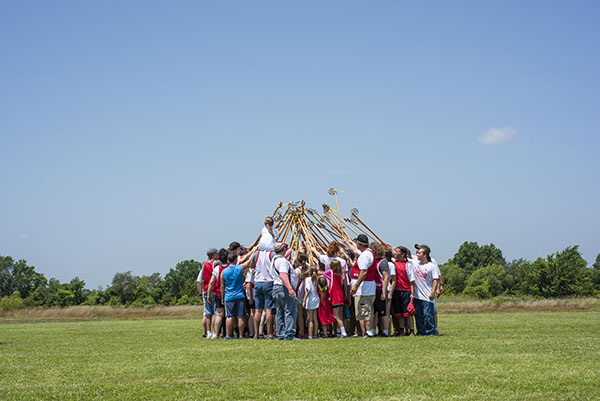Myaamia Center receives $472,397 Robert Wood Johnson Foundation grant
The funding will develop an assessment and evaluation protocol regarding health and wellness within the Miami Tribe of Oklahoma

Myaamia Center receives $472,397 Robert Wood Johnson Foundation grant
By Stella Beerman, Myaamia Center
The Myaamia Center has been awarded a $472,397 grant from the Robert Wood Johnson Foundation (RWJF) to fund the development of assessment and evaluation protocol regarding current and past ideas of health and wellness within the Miami Tribe of Oklahoma.
The Myaamia Center — a research-focused collaboration between Miami University and the Miami Tribe of Oklahoma — focuses on Myaamia language and cultural revitalization.
A project titled “Myaamia nipwaayoni: Tribal knowledge as a source of well-being” will be funded by the three-year grant from RWJF, a philanthropic organization dedicated to improving health and well-being in the United States.
Haley Shea, Myaamia research associate and co-principal investigator of the project, said the goal is to develop and measure interventions. The team wants to better understand what health and wellness mean to the Myaamia community to create better wellness programming based on this knowledge.
Miami Tribe of Oklahoma Chief Douglas Lankford wrote in the grant application, “We have long been interested in a more formal and robust understanding of the links between language and culture and our community’s well-being.”
The Miami Tribe community has seen plenty of anecdotal and observational evidence of how the community has benefitted from the language and cultural revitalization. However, tribal leadership and Myaamia Center researchers wanted to measure these benefits and continue using those metrics to make improvements within the community.
In 2012, they created the Nipwaayoni Acquisition and Assessment Team (NAATeam) to begin “observing, interpreting, and documenting” the impacts of cultural and language education within the community.
Using these assessments, historical data, and new research taking place during the project, Myaamia Center researchers hope to work with the NAATeam to create a culturally based Myaamia Wellness Model.
The Myaamia Wellness Model will lead to a measurement tool that community researchers can use to measure wellness within the Miami Tribe community and will ultimately assist the Myaamia Center in incorporating health and wellness topics into Myaamia programming and educational materials.
"So many health-related interventions are not as effective as they could be because they are not culturally specific,” Shea said.
The Myaamia Center takes a strength-based approach, where the researchers evaluate what makes the community strong, rather than focusing on weaknesses, and invests in those activities to nurture community well-being.
Eventually, the team will create a manual, detailing the research process and outcomes in hopes of helping other tribal communities create their own, culturally specific understandings and measures of health and wellness.
The research team hopes this manual will empower communities to determine interventions and health-promoting practices to support health in their own unique communities.
As always, the forefront of the research is to serve the Miami Tribe community, Shea explained. To ensure this research is best serving the community, members of the Miami Tribe of Oklahoma’s Cultural Resource Office will be involved in the project.
Daryl Baldwin, executive director of the Myaamia Center, and Shea are working together as co-principal investigators. While members of the Myaamia Center’s NAATeam and Office of Assessment and Evaluation will conduct and analyze research, a technology team will be working to update the current database and visualization applications to house the new data. Members of the center’s education office and a community health team will also be involved in the project.
Consulting on the project will be Joseph Gone, faculty director of Harvard University’s Native American Program; Roy Oman, professor of Public Health at the University of Nevada-Reno; and Ryan Rhodes, director of the Behavioral Medicine Laboratory at the University of Victoria, Canada.
The project team expects the initial research and documentation to take place in multiple phases over the next three years. However, as Shea explained, work like this is never truly done.
“This is an ongoing project and we will forever be engaged in this work,” Shea said. “The benefits of this project within the Miami Tribal community will extend far beyond these first three years.”